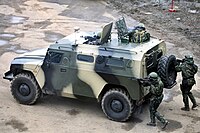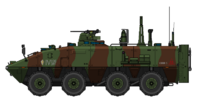Royal Security Police (Radictistan)
| Royal Security Police Dukliche Sicherheitpolizei | |
|---|---|
| Abbreviation | DSP |
| Agency overview | |
| Employees | ~387,000 |
| Jurisdictional structure | |
| National agency | Radictistan |
| Operations jurisdiction | Radictistan |
| General nature | |
| Operational structure | |
| Overviewed by | Ministry of Internal Affairs |
| Commissioned officers | ~42,400 |
| Enlisteds | ~344,600 |
| Minister responsible |
|
| Agency executive |
|
| Branches | 11
|
| Divisions | 7
|
| Facilities | |
| Sectors | 2,461 |
| Notables | |
| Significant operation | |
| Website | |
| www.dsp.pol.rd | |
The Royal Security Police (Radictistani: Dukliche Sicherheitpolizei) is the national police force of the Grand Duchy of Radictistan. It is organized on a paramilitary basis and is subordinate to the Ministry of Internal Affairs in peacetime and to the Ministry of Defense in wartime. The Royal Security Police has a strength of approximately 387,000 personnel split between commissioned officers and enlisted personnel. The Royal Security performs a variety of law enforcement and state security roles. It is presently occupying the lead role in the response to the wave of Communist terrorist activity in the County of Norcustsur.
Missions
The duties of the Royal Security Police include the following:
- Investigation of serious crimes, such as those relating to organized crime, state security, and the financial system (in conjunction with the Royal Mint Police).
- Counterespionage
- Counterterrorism
- Border patrol and anti-smuggling operations
- The security of the Royal Family, Prime Minister, and Cabinet ministers
- The security of Radictistani diplomatic missions abroad
- The security of foreign diplomatic missions and dignitaries
- The security of transportation facilities
- The security of vital government and energy infrastructure
- Territorial defense (as an auxiliary to the Royal Radictistan Army)[1]
The Royal Security Police is also responsible for much of the routine policing in Radictistan, particulary in rural areas with a low level of indigenous police presence, and in strategically sensitive areas such as Greater Nuxenstat. The agency has a particularly important role in policing the volatile and almost ungovernable blustats as few local or County police units have the training or the equipment to perform sovereignty missions in those areas.
History
Norcustsur conflict
At the beginning of the Norcustsur internal conflict following the Radictistan Automotive Works office bombing in Hartfer the Royal Security Police was designated the lead agency in response as mandated by the Internal Security Act. While thousands of Royal Radictistan Army personnel were deployed to Hartfer, they remained under operational control of the DSP. Despite the arrangement, the army began to gradually assume more independence in operations. A key turning point was Operation Firebird, an operation aimed at reestablishing control of the volatile Hartfer slums planned and executed primarily by the army.
Organization
The Royal Security Police is divided into eleven branches of service organized by role. Some, such as the elite Special Action Group and the Border Guard Service, are operational as well as administrative in nature. Others such as the numerically predominant Patrol Service have their personnel apportioned between regional divisions, one per county of Radictistan. The seven divisions are each subdivided into regions and sectors, the latter representing the lowest level operational structure. The boundaries of region and sector jurisdiction do not always correspond to political boundaries. As of 2017 there were 132 regions and 2,461 sectors.
A Royal policeman will typically remain within one branch of service for his entire career. However, transfers between geographic areas happen frequently to prevent the formation of corrupting local ties. Exceptions to the first rule are made if the officer or enlisted man is exposed as an undercover agent in one branch or cannot otherwise continue in his past role. Personnel assigned to the Royal and Diplomatic Protection Unit as well as the Official Integrity Division are never reassigned to other branches. If any member of those units cannot continue their career within the branch they must accept discharge.
Structure
- Patrol Service (Patrulsdeins): conducts visible day-to-day police activity in rural areas and areas of national importance, such as Greater Nuxenstat.
- Readiness Battalions (Bereitschaftbataillone)
- Light Armored Battalions (Leichte Panzerbataillone)
- Border Guard Service (Grenschutzdiens): border security and operation of land border crossing points (in conjunction with Radictistan Customs Agency)
- Royal and Diplomatic Protection Unit (Dukliche und Diplomatische Schutzabteilung): protection of the Royal Family, Prime Minister, Cabinet ministers, and foreign diplomats and embassies/consulates.
- Foreign Section (Ausenabteilung): security of Radictistani diplomatic missions in foreign countries
- Infrastructure Protection Service (Infrastrukturschutzdeins): security at government offices, power plants, and other strategic sites
- Organized Crime Division: responsible for investigations related to organized crime
- Criminal Investigation Bureau: investigates major crimes, especially those concerning state security, counterterrorism, espionage, and finance-related crimes
- Special Action Group (Spezialeinsatzgruppe): counterterrorism and hostage rescue special unit
- Transport Police (Verkehrspolizei): security at airports, train stations, public transit, and other transport-related sites
- Aeronautical Section: operates rotary and fixed-wing aircraft in support of RSP operations
- Official Integrity Division: responsible for internal affairs
Equipment
Aircraft
| Aircraft | Photo | Origin | Type | Versions | In Service | Notes |
|---|---|---|---|---|---|---|
| An-26 |  |
Transport | An-26B | 2 | Used exclusively by Special Action Group | |
| PC-6 |  |
Switzerland | Utility | PC-6/A1 Turbo Porter | 12 | |
| AS565 |  |
Utility | AS565 UB | 141 | ||
| S-70 |  |
Utility | S-70B | 24 | ||
| AW101 |  |
Utility | CH-71 | 12 | ||
| AW109 |  |
Utility | A109M | 55 | ||
| Cessna 441 |  |
Observation | 15 | Fitted with EO/FLIR | ||
| Bell 407 |  |
VIP | ≥11 | Owned by Ministry of Foreign Affairs, RSP-operated. |
Vehicles
| Vehicle | Photo | Origin | Role | In Service | Armament |
|---|---|---|---|---|---|
| Dingo 2 |  |
Transport/Assault | 2,800 | 1 x M2HB | |
| GAZ-3937 |  |
Transport/Assault | 700 | 1 x PKT | |
| GAZ-2975 |  |
Transport/Assault | 83 | 1 x PKM | |
| RAW 160 | Transport | 46,800 | None | ||
| RAW 162 | Transport | 75,900 | None | ||
| RAW 430 | Transport | 5,400 | None | ||
| LY83 | Template:Country data Lyras | Utility | 1,700 | Variable | |
| LY219 | Template:Country data Lyras | APC Ambulance C2 |
12 30 4 |
1 x M2HB 1 x PKM 1 x PKM | |
| VAE | Doomingsland | Assault | 125 | 23mm autocannon | |
| MA9A2 MGS MA9A2 CBRNRV |
  |
Anemos Major | Anti-tank CBRN |
146 20 |
120mm SC8.65 L/55 gun 1 x M2HB |
Firearms
| Model | Photo |
|---|---|
| Beretta 92SB | 
|
| Steyr AUG A2 | |
| Steyr AUG A3 | 
|
| Franchi SPAS-12 | 
|
| HK UMP | |
| H&K G36E | 
|
| FN Minimi | |
| HK MSG-90 |  – –
|
| SVD | 
|
| Barrett M82A1 |
Crew-served weapons
| Model | Photo |
|---|---|
| RPG-7 | 
|
| RPG-29 | 
|
| M224 | 
|
| Mk 19 | 
|
| 9K338 Igla-S | 
|
Ranks
Officers
| Ranks |
|---|
| Police Colonel-General Polizei Oberst-General |
| Police Lieutenant-General Polizei Leutnant-General |
| Police Major-General Polizei Major-General |
| Police Brigade-General Polizei Brigade-General |
| Police Colonel Polizei Oberst |
| Police Lieutenant Colonel Polizei Oberstleutnant |
| Police Major Polizei Major |
| Police Captain Polizei Kapitan |
| Police Senior Lieutenant Polizei Oberleutnant |
| Police Lieutenant Polizei Leutnant |
Enlisted
| Ranks |
|---|
| Police Sergeant Major Polizei Serzantmajor |
| Police Senior Sergeant Polizei Oberserzant |
| Police Sergeant Polizei Serzant |
| Police Junior Sergeant Polizei Unterserzant |
| Police Senior Corporal Polizei Oberkapral |
| Police Corporal Polizei Kapral |
| Police Private First Class Polizei Soldat 1. Klasse |
| Police Private Second Class Polizei Soldat 2. Klasse |
| Police Private Third Class Polizei Soldat 2. Klasse |
Personnel
The Royal Security Police has in its ranks approximately 42,400 commissioned officers and 344,600 enlisted personnel. Commissioned officers are trained at the Royal Security Police Academy located in the town of Meinfurt just outside the boundaries of Greater Nuxenstat. Enlisted personnel are trained at seven camps, one in each of Radictistan's seven Counties. RSP officers typically are of lower social class than military officers. The enlisted ranks are more diverse than is the case in the Army, with more western and urban recruits. With both officers and enlisted personnel, the Royal Security Police has a general preference against "legacy" recruits, those with parent or other relatives who serve or have served within the police ranks. This policy was created because of the government's fear that the Royal Security Police might become an insular, possibly anti-democratic force. All RSP personnel are required to abide by the same standards as military personnel regarding political activity. Endorsement of parties and candidates, appearance at political rallies and demonstrations in uniform, voting in uniform, and other activities associated with partisan activity are forbidden and punishable by lengthy prison sentences.
Because of their paramilitary status, Royal Security Police personnel are exempt from military conscription.
Popular perception
Radictistani popular attitudes towards the Royal Security Police, and towards law enforcement in general, are complicated. The Royal Security Police has a deserved reputation for being significantly less corrupt than its counterparts at the County and local levels. At the same time, it suffers from the same chronic and blanket distrust towards law enforcement as other agencies. This stems from a deeply entrenched set of attitudes in Radictistan which hold that individual liberty and the preservation of democracy are the most important values for society to have, even it it means allowing criminals to go free or the efficient functioning of the state to otherwise be severely impacted. The Royal Security Police is held under extremely close scrutiny by the public for these complex cultural reasons. Any deviation from excellence in community relations is swiftly and cruelly corrected. This policy has ironically created the stereotype of the national policeman who will not perform any task, no matter how trivial, without explicit instructions from higher authority.
The Royal Security Police has seen its reputation for effectiveness suffer as a result of its inability to prevent repeated attacks by the Communist Party of Radictistan during the ongoing internal strife in the County of Norcustsur.
Royal Security Police personnel are commonly referred to as "greyhounds" by members of the public due to the grey color of their dress uniforms.
Media portrayal
Karl Schumacher, the protagonist of the television series Schumacher, is a former member of a Bereitschaftbataillon reassigned as a sector chief in rural Eastval after being wounded during the 2014 Norcustsur Assembly elections.
Footnotes
- ↑ On mobilization the DSP will form 12 motorized infantry brigades attached to Army divisions centered around the thirty-six Readiness Battalions.